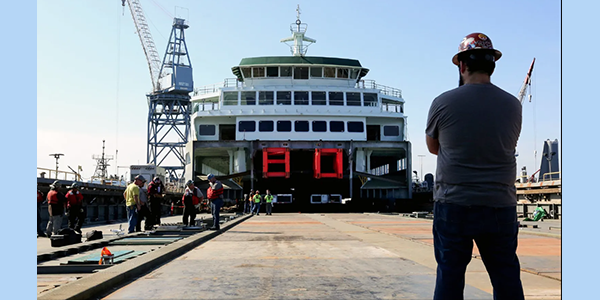||| FROM THE SEATTLE TIMES |||
Washington State Ferries is spending 4 billion in taxpayer dollars electrifying its fleet to combat global warming. While commendable, this undertaking overlooks our ferry system’s real crisis: a critical shortage of highly skilled and experienced marine engineers and oilers.
The shortage of essential crew members, caused by WSF’s low wages and benefits, is the key reason why the ferry system continues to fail to provide traditional levels of timely service and reliability. The agency has refused to compensate its workforce with pay that’s competitive enough to lure engineers away from gigs in the private sector. Chief engineers in the private sector are paid $300,000 and work half the year, whereas WSF’s chief engineers are earning less than $150,000 for year-round work. Surprisingly, WSF marine oilers are paid less than ticket-takers at the ferry terminal. In fact, WSF has gone from being one of the highest-paid ferry jobs in the country to one of the lowest.
The Washington State Ferry system is in crisis and is incapable of performing reliably. Ferry management has overpromised and underdelivered on solving the ferry service problems, hurting the Washingtonians who depend on the boats. WSF data shows last year alone, about 3,500 sailings were canceled. Based on data compiled by the Marine Engineers’ Beneficial Association, approximately 65% of those cancellations were the result of insufficient numbers of qualified marine engineers and oilers to meet crewing minimums required by Coast Guard regulations. A minimum of 200 marine engineers are needed every day to run all scheduled routes. If one person isn’t available due to illness or other reasons, it can paralyze the system. Every canceled trip threatens the livelihoods, health and well-being of our ferry-dependent communities. The ripple effects of those cancellations are unacceptable.
**If you are reading theOrcasonian for free, thank your fellow islanders. If you would like to support theOrcasonian CLICK HERE to set your modestly-priced, voluntary subscription. Otherwise, no worries; we’re happy to share with you.**









A simple Google search and you can look at both unions contracts. Oilers do not make less then a ticket taker
An investigation by a real law enforcement agency needs to look into the whole electrification of the WSF. Follow the money from award…bidders…and how it flows back to Komrade Insley. Because every single portion of his reign has resulted in less rights, lower wages, confiscation of private property all at the direction of Grifter Insley and his friends and family.
There’s some heavy irony involved in calling Insley a “communist” while complaining that a taxpayer-funded and heavily-subsidized public ferry system, which loses millions each year, isn’t living up to your expectations. Why not buy your own boat on the so-called free market so you can avoid this money-losing socialist public transit system altogether?
Was separate management created when the legislature removed the ferries from the state highway system? I have lived on Lopez, Bainbridge, Whidbey and now Orcas. How do you think this situation will affect you long term? Because this appears to be ‘no end in sight’.
2 more thoughts/questions: I’m pretty sure Eastern Washington won’t want to fund these gaps for the ferries, so there is that. Will this affect real estate values here long-term?
The state should get out of the ferry business and let a private owned company take over.
Most state run ventures are a ridiculous wast of ttax payers money .
State highway department should maybe be put out for bids. Probably be cheaper and get more for our tax money.
I wondered why the ferry system had an issue with staffing boats when so many boats are out of service. That should have created a glut of workers instead of a shortage. Now it makes sense and not sense. What a colossal case of mismanagement. The entire management of the ferry system should be fired for malfeasance starting with the head of the department. What a waste of taxpayer resources! There is no excuse other than stupidity for anyone to have allowed this to develop during their watch. It seems to be a common theme under Jay Inslee.